The Top 3 Struggles of Traveling With an Infant (And Ways to Cope)
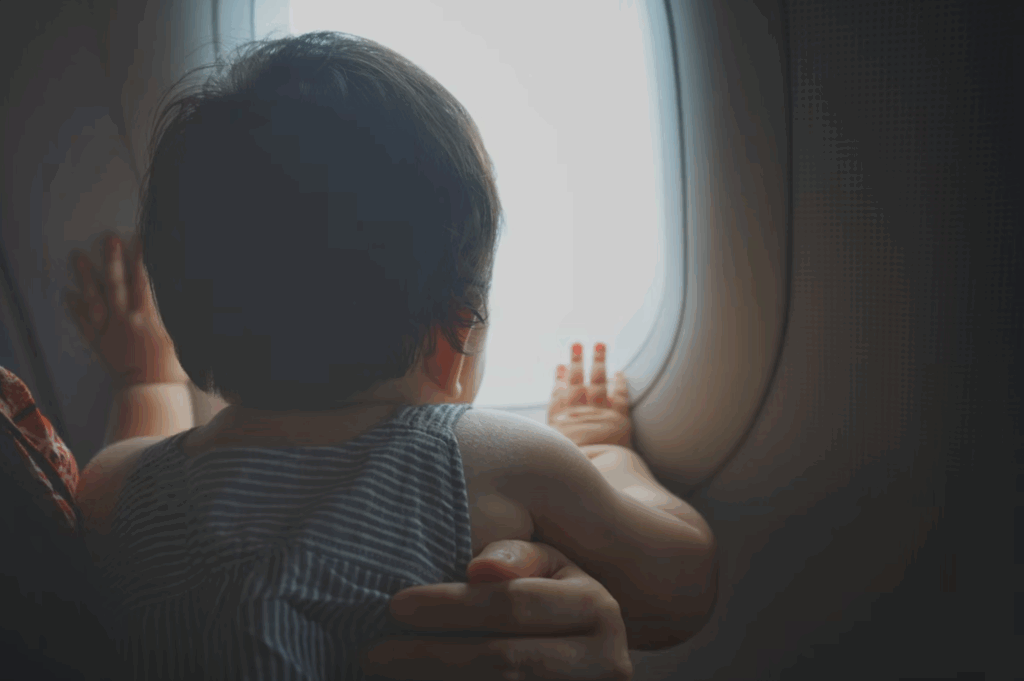
Imagine the quiet hum of a plane’s engine ready to gain traction and the soft whir of the wheels against the airport’s terminal. That’s what the thrill of embarking on an adventure sounds like.
Now, add to it the delicate cries of a newborn. The constant needs of a tiny human dependent on you can fill the journey with excitement, exhaustion, and moments of pure vulnerability.
Navigating through bustling airports, cramped spaces, and crowded tourist spots with an infant is an overwhelming responsibility. To begin with, airlines have become family-friendly, with British Airways bagging the top spot, followed by Emirates and Air Canada.
Still, the world becomes vastly different when you’re carrying the weight of new life in your arms. In this article, we will discuss the top three problems that parents most commonly face and ways to cope with each.
The Overwhelming Amount of Gear
One of the first surprises that awaits parents traveling with an infant is just how much stuff such a tiny person needs. Packing a baby’s stuff, even for a weekend getaway, feels more like a cross-country move.
If you’re not used to it, things can become overwhelming pretty soon and easily. This is why seasoned travelers recommend taking a practice trip first. In other words, you should start small (like an overnight trip) and work your way towards a two-week or even a month-long vacation.
The practice trip will help you understand what it’s like to travel with your little one. It’s also a great place to gain insights, particularly into packing the right essentials. Be prepared to give up a simple carry-on in exchange for multiple bags, strollers, and even mysterious contraptions you didn’t know existed.
At home, every important item is usually within arm’s reach. On the road, you need to think ahead of every possible need and pack accordingly. Here is a not-so-exhaustive list of essentials parents often need to pack for their infant –
- Diapers for the entire journey, including extras for any unexpected blowouts
- Sanitizing essentials like wipes and burp cloths
- An extra set of clothes, not just for yourself but for your baby, because accidents happen
- Feeding supplies like pumping equipment, formula, bottles, or donor milk with cooling packs
- Sleep gear, which includes portable cribs, blankets, etc.
- Health and safety items like a basic first-aid kit, baby-safe sunscreen, and a thermometer
How to Cope
Since packing for a newborn is already complex, try not to complicate it further. This means simplifying wherever you can. For instance, choose multipurpose items like a stroller that converts into a car seat or a backpack that doubles as a diaper bag.
Use compression packing cubes to organize your baby’s essentials for easy access. Most importantly, make simplification a lifestyle, not just a travel-related practice. According to a recent study, Americans spent a major portion of their baby’s budget on diapers, clothes, food, and child care.
Most admitted to overspending on baby gear, especially during the infant’s first year of life. Avoid overspending (while traveling or otherwise) by prioritizing needs vs. wants. If you’ll be staying at a hotel, look for baby-friendly accommodations that offer cribs, high chairs, etc., letting you lighten your load dramatically.
Feeding Challenges on the Go
Feeding a baby at home comes with an established routine and comfort. However, traveling can be a little more complicated and stressful.
Research the destinations and their airports to see how baby-friendly they are. For instance, breastfeeding families will need private spaces. Don’t lose hope because airports like the IGA Istanbul Airport, ranked the most family-friendly, offer focused baby-friendly services and designated feeding areas.
Another scare is the possibility of facing breastfeeding issues. Many new mothers experience a shortage of milk supply due to travel stress, physical fatigue, and disrupted feeding schedules. They may plan on packing baby formula as an important backup.
However, not all destinations have access to the sterile warm water needed to prepare baby formula. Some countries where the water quality is exceptionally low, and even dangerous, are Chad, Niger, and Madagascar. Even small volumes of contaminated water can harm a baby’s immature immune system.
Also, it’s not safe to suddenly alternate between breast milk and formula. The baby may experience digestive issues like bloating, constipation, or gas.
Speaking of digestive issues, baby formulas like Enfamil and Similac have caused a serious gastrointestinal condition called Necrotizing Enterocolitis (NEC). According to TorHoerman Law, lawsuits against the manufacturers have been filed in US state and Federal courts.
The NEC lawsuit is expected to set a legal precedent, potentially leading to changes in industry standards and regulations. However, the safest option currently is to feed donor milk from reliable milk banks. Accessing donor milk while traveling also requires careful planning.
How to Cope
If you’ll be breastfeeding, it’s important to plan feeding breaks in your schedule. This is not any different from layovers or bathroom stops. In the case of an airport, check where the nursing rooms are via apps and online maps.
If you are in a public place and there aren’t many options, remember that your baby’s nourishment overrides everything. You can use discreet measures like using a light blanket, nursing cover, or scarf.
Check whether your destinations have access to donor milk. Contact relevant milk banks in advance for availability. Choose accommodations with refrigeration provisions, as donor milk must be kept frozen. Also, carry essentials like ice packs, thermometers, and storage bags.
Sleep (or Lack of It)
Another significant challenge often associated with traveling with a baby is a disrupted sleep routine. It is believed that babies usually thrive on their routines.
Travel tends to throw their routines out the window, leading to inconsistent sleeping patterns. This is especially true when clocks change for better utilization of daylight hours. A recent survey conducted on 600+ children found that when clocks changed in Spring, it took infants eight days to resume their original bedtime routine. That’s what setting the clocks just one hour ahead can do!
While traveling, there are added disruptions over time zone differences, like changes in the environment and a lack of proper sleep arrangements. Parents need to remember that babies are highly sensitive to their surroundings, especially when it comes to sleep.
Their immune systems may take a hit when they do not get sufficient sleep. This increases their susceptibility to developing illnesses.
Plus, you may observe that your baby is becoming more fussy and irritable. Some parents even report increased instances of teething, colic, and discomfort. The biggest threat is that a consistent lack of sleep can quickly spiral into a vicious cycle.
How to Cope
You need to plan to ensure your baby gets proper sleep, just like you would their feeding schedule. That doesn’t mean you can mitigate all distractions. Still, it’s possible to manage sleep better by sticking to familiar bedtime routines as far as possible.
Try adapting your travel schedule to meet your baby’s sleep needs, including overnight stays and rest stops. Limit stimulation before bed by creating a dim and calm environment that is conducive to sleep.
Take turns with your partner to ensure both parents get enough rest. If your baby loves being rocked to sleep, carry backups such as a portable swing or a travel crib for their comfort.
As you finally venture out with your little one, let careful planning and mental strength be your steady anchor on the road ahead. Expect the unexpected to happen, as many parents have walked this journey before you.
Do your best to keep your baby comfortable, safe, and at ease. You must also make room for grace because some things are only perfected through trial and error.
Consider jumping onto the latest trend of multi-generational travel. You will have a built-in support system for help. Choose an all-inclusive getaway or cruise, which are the most popular presently. No matter what, focus on making the most of every trip that you get to share with your precious little one.
Remember, never travel without travel insurance! And never overpay for travel insurance!
I use HeyMondo. You get INSTANT quotes. Super cheap, they actually pay out, AND they cover almost everywhere, where most insurance companies don't (even places like Central African Republic etc!). You can sign-up here. PS You even get 5% off if you use MY LINK! You can even sign up if you're already overseas and traveling, pretty cool.
Also, if you want to start a blog...I CAN HELP YOU!
Also, if you want to start a blog, and start to change your life, I'd love to help you! Email me on johnny@onestep4ward.com. In the meantime, check out my super easy blog post on how to start a travel blog in under 30 minutes, here! And if you just want to get cracking, use BlueHost at a discount, through me.
Also, (if you're like me, and awful with tech-stuff) email me and my team can get a blog up and running for you, designed and everything, for $699 - email johnny@onestep4ward.com to get started.
Do you work remotely? Are you a digital nomad/blogger etc? You need to be insured too.
I use SafetyWing for my digital nomad insurance. It covers me while I live overseas. It's just $10 a week, and it's amazing! No upfront fees, you just pay week by week, and you can sign up just for a week if you want, then switch it off and on whenever. You can read my review here, and you can sign-up here!





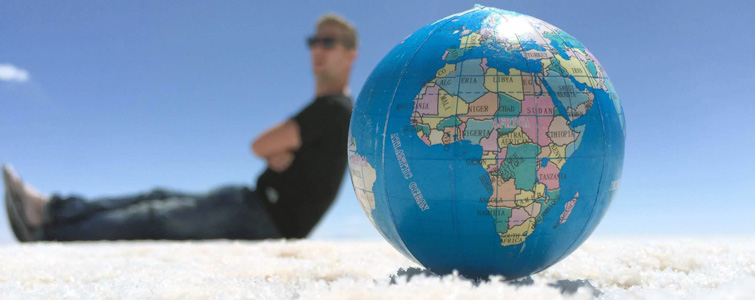

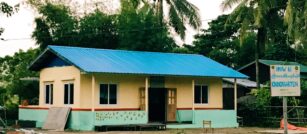
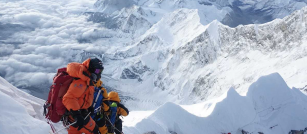
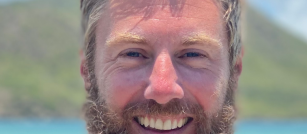



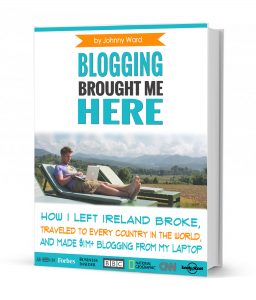 As you know, blogging changed my life. I left Ireland broke, with no plan, with just a one-way ticket to Thailand
and no money. Since then, I started a blog, then a digital media company, I've made
more than $1,500,000 USD, bought 4 properties and visited (almost) every country in the world. And I did it all from my laptop as I
travel the world and live my dream. I talk about how I did it, and how you can do it too, in my COMPLETELY FREE
Ebook, all 20,000
words or so. Just finish the process by putting in your email below and I'll mail it right out to you immediately. No spam ever too, I promise!
As you know, blogging changed my life. I left Ireland broke, with no plan, with just a one-way ticket to Thailand
and no money. Since then, I started a blog, then a digital media company, I've made
more than $1,500,000 USD, bought 4 properties and visited (almost) every country in the world. And I did it all from my laptop as I
travel the world and live my dream. I talk about how I did it, and how you can do it too, in my COMPLETELY FREE
Ebook, all 20,000
words or so. Just finish the process by putting in your email below and I'll mail it right out to you immediately. No spam ever too, I promise!
